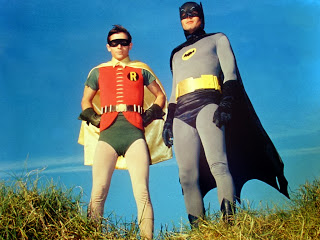The kid sidekick serves as a conversation foil, comic relief, and something to help bring the kids in. It's actually a quite useful device. Spider-Man originally broke the rules to great effect by being the kid in his own comic! But thought balloons helped bring the reader in—almost like the reader was actually Spider-Man’s sidekick!
In general, it always helps to have a Sancho Panza, a Watson, a Robin, a Bucky, a Jimmy Olsen, etc. for the main character to talk to, and often to add comic relief. I loved the Curt Swan era Superman, but I do remember a heavy reliance on thought balloons back then, since he usually didn't have someone flying along next to him to talk to. Lately, they've been making a lot of use of Commissioner Gordon in Batman comics (not to mention the last three movies!). Has he become the sidekick? Without Robin around, somebody had to; nature abhors a vacuum.
I understand people hating Robin because they think he diminishes Batman somehow, but I think the opposite is true. There's something wonderful about Batman—whose parents were murdered in front of his eyes and he had to grow up without them—taking on the parent role for someone else who experienced the same thing he did. I think that's why writers keep coming back to bringing in Robin. (Though I can live without any of the post-Dick Grayson Robins. It starts to get creepy.) He completes Batman. He's hope. He's hope for someone whose life was seemingly ruined as a child. If not for Robin, writers would be tempted to take Batman's story to its logical conclusion—he would die horribly, sad and alone, probably crazy looking for a vengeance he can never truly complete. Robin saves Batman.
Literally! In the 1960’s, when Adam West and Burt Ward donned the skintight outfits and came into everyone’s living room twice a week, Batman was revived. The comic book was actually on the verge of cancellation before then, and now BATMAN was a nationwide sensation. And would the TV show have been successful without Robin? Probably not. Likely not.
Even Christopher Nolan, who gave us the most serious and real world Batman of all, and who swore up and down that he would never bring in Robin to his movies—he ended up having Batman pass the mantle on to someone named Robin. Nolan didn't have to do that. There are a hundred other Batman stories he could have told. He didn't have to jump to the end of Batman's career, but that was the strongest story he wanted to tell. The passing of the mantle story. And even he knew that everyone would have been disappointed if the mantle went to anyone other than a Robin.
That seems to be an indispensable part of the myth that is developing—one day Bruce Wayne will pass the Batman identity on to another...only then does Batman truly become a legend.
In the comics and at least the main animated show, Dick Grayson has grown into his 20’s and left the Robin persona behind. He has become his own man named Nightwing, and I’m more than okay with that. I like that he has grown and found his own path. But one day…
Other characters consider him the best person they know, the best hero and the best man. In one of the better comics, Batman talks to Nightwing and asks him (and I’m paraphrasing) why he’s not as messed up as Batman himself is. Dick Grayson tells him “You had no one, Bruce, but I had you.” An honest moment, a moving moment, a moment frozen in time that tells Batman that, no matter how his war on crime ultimately ends, he has already won.
Robin makes Batman human. Robin saves Batman. And that’s the case for Robin.






No comments:
Post a Comment
Note: Only a member of this blog may post a comment.